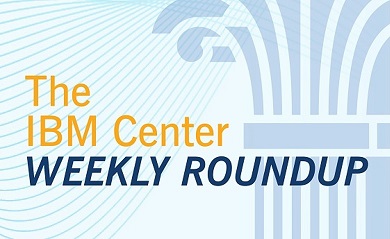This post first appeared on IBM Business of Government. Read the original article.

Articles & insights in public management & leadership for the week ending April 12, 2024
Managing Strategically: A Thought Process for Federal Managers. Federal managers are expected to advance measurable progress against an increasing number of competing demands, but making sense of these demands can often be overwhelming. This paper by Donnie Matlock and Amy Squires from Mitre attempts to address challenges by outlining a thought process for federal managers to make strategic decisions.
USDS Chief Shares How Direct File Became a CX Success. The U.S. Digital Service (USDS) partnered with the IRS to launch the new Direct File Pilot Program, which USDS Administrator Mina Hsiang said is an “incredibly exciting” customer experience (CX) achievement. Direct File is an online tool that allows taxpayers with simple tax situations in 12 states to file their taxes directly with the IRS. Currently, Hsiang said there are about 20 million people who are eligible to file using this application. “I think that’s one of the first things: start small. Many of you work on programs that have huge distribution and there is this expectation that you’re going to do a ‘Big Bang’ launch that will apply for every single human in America on day one, and that’s just not realistic. That’s not how any services or products get rolled out.”
TMF Leaders Prioritizing Modernization Playbooks. Two members of the Technology Modernization Fund (TMF) Board said that the group is prioritizing shareable playbooks so all the federal government can benefit from agencies’ modernization projects. Sheena Burrell, chief information officer, at the National Archives and Records Administration (NARA) and TMF board member – said that each of the fund’s awardees create a playbook for their TMF project that then becomes publicly available for other agencies to follow. Harrison Smith, the acquisition innovation advocate at the Federal Deposit Insurance Corporation and a TMF board member, said that the playbooks are an “incredibly important part of what’s going on. The availability and the shareability and the reuse and expansion, of not only technologies and code, but also the approaches to the projects,” Smith said.
VA Proposes ‘Maintenance’ IT Budget for FY2025, EHRM Relying on Unused Funds. Secretary of Veterans Affairs (VA) Denis McDonough said that his department’s fiscal year (FY) 2025 budget request features a “maintenance” IT budget, and that the agency plans to dip into money left over from previous years to fund IT programs such as its Electronic Health Record Modernization (EHRM) program. The proposed FY2025 budget features a 44 percent cut to the agency’s IT modernization account and a 52 percent cut to EHRM program funding. The EHRM cut is reflective of the agency’s decision to reset the program while the VA and contractor Oracle Cerner focus on improvements at the five sites where the EHR system is currently deployed.
AI/ML Efforts Bearing Fruit at State Department. The State Department is beginning to see positive results from having taken on artificial intelligence and machine learning (ML) tech work in the earlier stages of their development notes Matthew Graviss, chief data and artificial intelligence officer for the Office of Management Strategy and Solutions at the State Department. “We’re seeing the gains and the benefits of AI and machine learning on the mission side and on the management side,” said Graviss. He cited one use case in which the agency applied the technology to a requirement that it declassify information after a 25-year waiting period.
OPM Issues Rule to Expand Early Talent Workforce Pipeline. The Office of Personnel Management (OPM) issued a final rule Thursday to expand opportunities for early career talent in the federal government. The new rule updates the Pathways Programs, including expanding skills-based hiring through qualified career programs, raising the ceiling for starting salaries for recent graduates, and easing the path for interns to be converted into permanent positions. According to OPM, the final rule issued on April 11 is one of the most significant actions the Federal government has taken since the program’s inception 14 years ago.
Space Force Unveils Plan to Leverage Commercial Space Tech. The U.S. Space Force released a new plan on April 10 that realigns and reprioritizes the service branch’s steps to better integrate commercial space capabilities. The Commercial Space Strategy serves as a companion to the Pentagon’s Commercial Space Integration Strategy released on April 2. The Pentagon’s strategy outlines how it will try to increase its use of commercial space technologies, while the Space Force’s strategy goes into further detail on how it will execute that effort with a particular focus on acquisition.
THIS WEEK @ THE CENTER
NEW BLOGS
- Exploring Life Ignition Tools (LIT) by Michael J. Keegan – Leadership Lessons from Dr. Jeff Karp, Author & Biomedical Innovator
- Artificial Intelligence Development for Government Agencies: Strategies for Ethical and Effective Implementation by Dan Chenok — The IBM Center and the Partnership for Public Service hosted a roundtable with government leaders and stakeholders on how the responsible use of artificial intelligence can benefit the public by improving agency service delivery.
ICYMI – Exploring Life Ignition Tools. This week Michael Keegan welcomed Dr. Jeff Karp to discuss insights from his new book LIT: Use Nature’s Playbook to Energize Your Brain, Spark Ideas, and Ignite Action, explore life ignition tools, how LIT can help one lead more effectively, and why it is so important for leaders to act with intention in everything they do.
